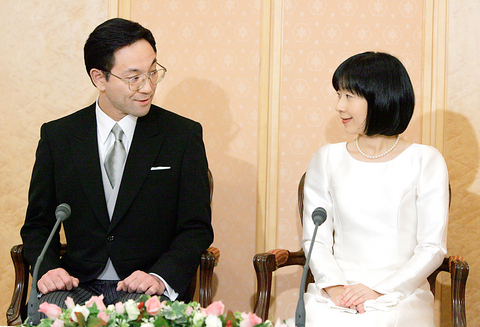Japanese Princess Sayako descended to the rank of commoner and housewife yesterday by marrying a government employee, but for many of the thousands of women watching it was still a Cinderella story.
Although Japanese women seek careers and are settling down later than ever, few families, let alone the emperor's, would talk proudly about their first-born daughter not marrying until age 36.
Perhaps that's why the well-wishers who lined the streets of Tokyo saw the wedding of the emperor's only daughter as a special happy ending.

PHOTO: AP
"I myself had so much pressure [to get married] from my family members because I'm the first daughter," said Azusa Hirai, 31, who tied the knot in April.
Hirai waited more than an hour on the roadside to witness Sayako's seven-minute parade, a modest affair for a princess who turned into a commoner under imperial tradition.
"I was really excited about her wedding," the housewife said. "I had been checking today's weather forecast for a week."
"I think she is different from Princess Masako or Princess Kiko, who married into the imperial family," she said, referring to the wives of Sayako's two elder brothers. "Sayako must have had a lot of tough time because everyone was watching her."
The crowd that gathered on the roadside from the the Imperial Palace to the Imperial Hotel, where she had the Shinto-style wedding ceremony, was not large compared with the wedding parade in June 1993 when Masako married Crown Prince Naruhito.
But about 6,000 people came out on the work day and more than 2,000 lined up to enter their names in the congratulatory books.
Sayako is the youngest child of Emperor Akihito and Empress Michiko and the last of their three children to wed. No female royal has married in her late 30s in recent history.
Sayako has married Yoshiki Kuroda, a childhood friend of her one of her brothers.

Auschwitz survivor Eva Schloss, the stepsister of teenage diarist Anne Frank and a tireless educator about the horrors of the Holocaust, has died. She was 96. The Anne Frank Trust UK, of which Schloss was honorary president, said she died on Saturday in London, where she lived. Britain’s King Charles III said he was “privileged and proud” to have known Schloss, who cofounded the charitable trust to help young people challenge prejudice. “The horrors that she endured as a young woman are impossible to comprehend and yet she devoted the rest of her life to overcoming hatred and prejudice, promoting kindness, courage, understanding

US President Donald Trump on Friday said Washington was “locked and loaded” to respond if Iran killed protesters, prompting Tehran to warn that intervention would destabilize the region. Protesters and security forces on Thursday clashed in several Iranian cities, with six people reported killed, the first deaths since the unrest escalated. Shopkeepers in Tehran on Sunday last week went on strike over high prices and economic stagnation, actions that have since spread into a protest movement that has swept into other parts of the country. If Iran “violently kills peaceful protesters, which is their custom, the United States of America will come to

‘DISRESPECTFUL’: Katie Miller, the wife of Trump’s most influential adviser, drew ire by posting an image of Greenland in the colors of the US flag, captioning it ‘SOON’ US President Donald Trump on Sunday doubled down on his claim that Greenland should become part of the US, despite calls by the Danish prime minister to stop “threatening” the territory. Washington’s military intervention in Venezuela has reignited fears for Greenland, which Trump has repeatedly said he wants to annex, given its strategic location in the arctic. While aboard Air Force One en route to Washington, Trump reiterated the goal. “We need Greenland from the standpoint of national security, and Denmark is not going to be able to do it,” he said in response to a reporter’s question. “We’ll worry about Greenland in

PERILOUS JOURNEY: Over just a matter of days last month, about 1,600 Afghans who were at risk of perishing due to the cold weather were rescued in the mountains Habibullah set off from his home in western Afghanistan determined to find work in Iran, only for the 15-year-old to freeze to death while walking across the mountainous frontier. “He was forced to go, to bring food for the family,” his mother, Mah Jan, said at her mud home in Ghunjan village. “We have no food to eat, we have no clothes to wear. The house in which I live has no electricity, no water. I have no proper window, nothing to burn for heating,” she added, clutching a photograph of her son. Habibullah was one of at least 18 migrants who died